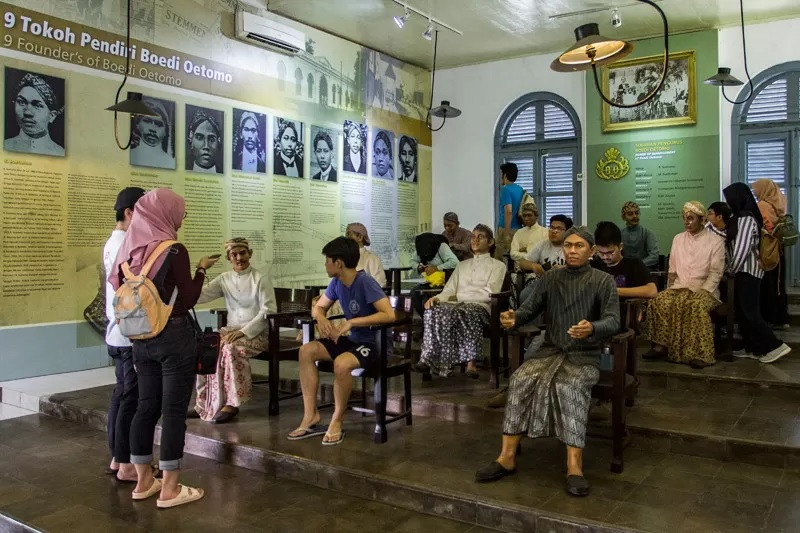Popular Reads
Top Results
Can't find what you're looking for?
View all search resultsPopular Reads
Top Results
Can't find what you're looking for?
View all search resultsQuestioning historical revision
Critics suspect the project aims to glorify the incumbent government and will serve as "official history" in textbooks across all educational levels, at least for Prabowo's five-year term.
Change text size
Gift Premium Articles
to Anyone
C
ulture Minister Fadli Zon's plan to launch a newly rewritten history of Indonesia by Aug. 17, in time for the nation's 80th Independence Day, is sparking both anticipation and controversy. Described as a "special gift", the initiative raises questions about whether it will unify the nation or ignite a new round of debate, especially given this nation's historical precedents of "victors writing history" and concerns that "rewriting the past" can be instrumentalized by populists.
The timing is particularly notable as President Prabowo Subianto, who is also Fadli’s boss at the Gerindra Party, assumed power after winning the 2024 election by a landslide. However, the former Army general’s own past includes controversies that have remained unresolved.
Fadli asserts that "History will be written correctly." His own literary production, including such works as Politik Huru Hara Mei 98 (The May 1998 Political Riots), and The IMF Game: The Role of the IMF in Bringing Down the Suharto Regime in May 1998, offers insight into his perspective.
The project involves over 100 historians from various universities, who have been working for the last few months. These historians are tasked with writing, revising and editing the new narrative based on references and scientific studies, including previously published history books.
The upcoming history book will trace human presence in Indonesia from Homo erectus through Dutch colonization and, notably, Prabowo's election as president. A key revision will challenge the long-held belief that the Dutch ruled the archipelago for 350 years, suggesting a much shorter period. This revision raises questions, as it could be seen as superfluous to bring forth such a fundamental narrative revision of a period deeply ingrained in Indonesian historiography since independence in 1945. The facts of Dutch colonialization are undeniable.
While the lessons of history can be vital to prevent the repetition of past mistakes such as human rights violations, corruption and abuses of power, many are skeptical that this new version will address the more "shameful acts" of the past. Critics suspect the project aims to glorify the incumbent government and will serve as "official history" in textbooks across all educational levels, at least for Prabowo's five-year term.
President Prabowo has openly expressed admiration for his former father-in-law, Soeharto, who stepped down in May 1998 following mass protests demanding reforms. Prabowo has also consistently advocated for Soeharto to be granted national hero status. Under Law No. 20/2009, the President holds the authority to confer this posthumous title, making it a likely occurrence this year.
Concerns among historians and human rights activists are high regarding the potential for historical revisionism of past crimes, particularly those from the New Order and Reform eras. There is apprehension that the new narrative may emphasize achievements while downplaying or omitting the problems and abuses that occurred during those periods.
Chairman of the Alliance for Historical Transparency in Indonesia (AKSI) Marzuki Darusman, who is also a former attorney general, labeled the project a dangerous attempt to "engineer the past". He asserted that the government is aiming to establish a single, dominant interpretation of the nation's history.
While Fadli is within his remit as Culture Minister to publish the revision, many hope he will not hastily mandate its use in educational institutions. The fundamental question remains: What is the true urgency behind this rewriting of history?
For an authoritarian regime, reconstruction of the past is intended to create a monumental history in its favor. More than that, a single interpretation of national history will serve as a tool to impose governmental control over public thought and behavior.
We second the sentiment that "history is a dynamic discourse, not a dogma”, but rewriting history without consulting the public at large can lead to undue glorification of what the New Order and the Reform era achieved while minimizing the problems that arose during those times, some of which we still face today.
Many believe that the 80th Independence Day celebrations can be more productively focused on showcasing technological advancement and rapid economic development, as well as providing more job opportunities for youth, perhaps offering a more concrete "gift" to the nation.











